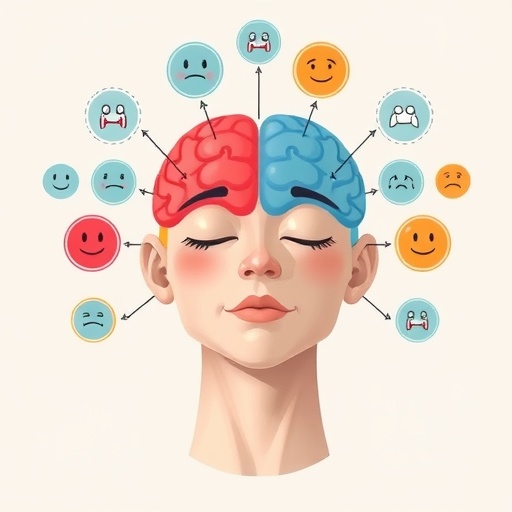In a groundbreaking study published in the journal Discover Mental Health, researcher S. Ikeda dives deep into the intricate relationships between emotional vocabulary, bodily sensation awareness, depression, and the role of mindfulness in psychological adjustment. This research sheds light on how our ability to articulate feelings impacts mental well-being, particularly in those struggling with depression. The investigation highlights that emotional intelligence, defined in part by the richness of one’s emotional vocabulary, plays a crucial role in mental health outcomes.
As the world grapples with increasing rates of depression, understanding the nuances of how we express emotions has never been more crucial. Ikeda’s study reveals a fascinating dimension of emotional health: those equipped with a more extensive vocabulary for emotions tend to navigate their depressive symptoms more effectively. The ability to label and articulate feelings may provide cognitive and emotional clarity, allowing individuals to address their mental health issues more efficiently.
An essential aspect of the research involves exploring the sensitivity to bodily sensations, often referred to as interoceptive awareness. This concept highlights how individuals perceive and interpret physical signs of emotion, such as tightening in the chest or a flutter in the stomach. Ikeda posits that individuals with a heightened sensitivity to these bodily signals can develop a better understanding of their emotional states, which can lead to improved emotional regulation and coping strategies. This perspective shifts the focus from traditional cognitive-behavioral frameworks to a more holistic view of emotional health.
The interplay between emotional vocabulary and bodily sensations also emphasizes the importance of mindfulness as a mediating factor. Mindfulness practices encourage a non-judgmental awareness of experiences, which can enhance one’s ability to identify emotions and bodily sensations. Through mindfulness, individuals can cultivate a present-moment awareness that facilitates emotional processing and reduces the likelihood of depressive symptoms. The study suggests that integrating mindfulness into therapeutic approaches might be essential for those struggling with depression.
Ikeda’s research raises critical questions about how we can foster emotional vocabulary growth in people of all ages. From childhood education to adult therapy, strategies that promote emotional language skills can be transformative. Teaching children to articulate their feelings can empower them with tools to face mental health challenges throughout their lives. A rich emotional vocabulary might not only serve as a protective factor against depression but also as a means to enhance overall emotional intelligence.
The findings also have implications for therapeutic practices. Mental health professionals may need to consider the role of emotional vocabulary and bodily sensation sensitivity when developing treatment plans for their clients. Tailoring interventions to enhance emotional expression could be a game-changer for many individuals experiencing depression. For example, art therapy, journaling, or expressive writing workshops could provide effective avenues to expand emotional language.
Another crucial element in Ikeda’s study is the recognition that not all individuals experience emotions in the same way. Cultural factors, personal histories, and even neurological differences can influence how people conceptualize and communicate their feelings. These variances underscore the importance of a personalized approach to mental health care—one that acknowledges and respects individual differences while promoting the growth of emotional vocabulary and interoceptive awareness.
Moreover, the study touches on the connection between emotional vocabulary and resilience. Individuals who can articulate their emotional experiences may be better equipped to bounce back from adverse situations. This resilience can be particularly important in the context of depression, where feeling overwhelmed by emotions can lead to a downward spiral. By enhancing emotional clarity and awareness, individuals can cultivate stronger coping mechanisms.
As mental health discourse becomes more prevalent in society, the insights provided by Ikeda’s research may serve as a catalyst for broader public conversations about emotional literacy. Community education programs aimed at facilitating emotional vocabulary growth might foster environments where individuals feel safe to express their feelings and seek help without stigma. By removing barriers to emotional communication, society could significantly improve overall mental health outcomes.
This research also opens the door for future inquiries into the relationship between language and emotion. How do different languages conceptualize emotions? Are there cultural differences in emotional expression that impact mental health? Understanding the broader implications of emotional vocabulary in various socio-cultural contexts will be pivotal in the quest to address global mental health issues.
In conclusion, Ikeda’s study stands as a vital contribution to our understanding of the interplay between emotional vocabulary size, sensitivity to bodily sensations, mindfulness, and depression. The examination of these relationships underscores the complexity of mental health and the various pathways through which individuals can achieve emotional well-being. As the exploration of these themes continues, it is hoped that both researchers and practitioners can apply these insights in ways that will foster more effective mental health care and support systems.
Overall, Ikeda’s work serves as a reminder that words have power—the words we use to describe our emotions, our awareness of our bodily responses, and our practice of mindfulness can shape our mental health and lives profoundly. Emphasizing the importance of these aspects may lead to more fruitful explorations in the field of psychology and improved strategies for managing mental health challenges.
Subject of Research: Emotional vocabulary size, sensitivity to bodily sensations, and their impacts on depression, alongside the role of mindfulness.
Article Title: Effects of emotion vocabulary size and sensitivity to bodily sensations on depression: examining the role of mindfulness in adjustment.
Article References:
Ikeda, S. Effects of emotion vocabulary size and sensitivity to bodily sensations on depression: examining the role of mindfulness in adjustment.
Discov Ment Health 5, 105 (2025). https://doi.org/10.1007/s44192-025-00250-1
Image Credits: AI Generated
DOI:
Keywords: Emotional vocabulary, depression, mindfulness, interoceptive awareness, emotional intelligence, mental health.




